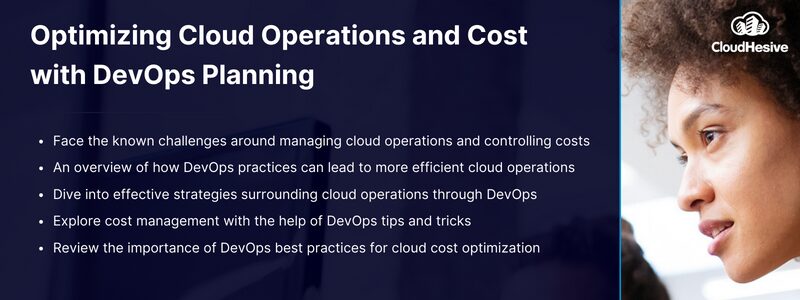DevOps planning tips and tricks can help your organization balance operational efficiency and cost management.

Even though implementing DevOps planning comes with many well-known benefits within the Software as a Service (SaaS) industry, optimization can come with a few unique challenges. Integration of DevOps isn’t so challenging; it’s optimizing the services and processes associated with it that’s the hard part. Most of this comes down to operational efficiency and cost management.
Migrating entire operations to the cloud requires a lot of organization and processes in place beforehand. Cloud technology is only becoming more prevalent in software development, with many organizations scrambling to handle migration effectively and efficiently.
It’s a hot topic that can quickly snowball for a business, meaning it should be a focal point alongside any other cost. DevOps planning can help streamline cloud operations, reducing potential costs and downtime. Combining the right strategies for cloud operations through DevOps planning can help SaaS companies optimize their cloud infrastructure for better cost savings and operational efficiency.
The role of DevOps in cloud cost optimization
Cloud cost optimization through DevOps is necessary to allocate cloud resources more efficiently based on various workload requirements. Although cloud technology has made managing costs and resources more accessible, that doesn’t mean businesses shouldn’t continue to crunch numbers.
Thankfully, the traditional way of doing this is trumped by the help of best practices in DevOps. Optimizing cloud costs requires identifying performance thresholds for every current workload.
DevOps in cloud cost optimization considers several factors:
- Changing workload requirements
- Everyday costs
- Managing performance
- Security measures
- Compliance requirements
- And more
Some points may pose more roadblocks than others, but combining DevOps practices and cloud technology can help manage it all.
Strategies for efficient cloud operations through DevOps
Depending on the needs of the organization, there are a handful of DevOps practices that can help to optimize cloud operation costs. DevOps and cloud technology may shift at a pace that’s hard to keep up with, but there’s more than enough actionable support that SaaS companies can use. Each organization is bound to approach costs around cloud operations differently, but that’s the beauty behind the solutions DevOps brings to the table.
-Setting a budget
This may be easier said than done, but setting budgets is essential to managing cloud infrastructure and operations. Costs should align with the needs and objectives of all departments. This is especially true with all angles, such as speed, resiliency, downtime, and ongoing discussions in the trajectory of development.
Working with a solidified budget before walking into any development project can help provide a more transparent, prepared roadmap for the challenges ahead. Financial discipline leads to better resource allocation, which benefits everyone involved in the project, including the organization.
-Identifying idle resources
For any SaaS company, there are going to be quite a few resources that fall through the cracks during development. On the other hand, these resources could merely be idle if they aren’t needed. Regardless of the reason, idle resources can easily increase costs without leaving a paper trail that’s immediately noticeable.
An excellent example is when companies provision resources after certain tasks are completed.
-Cloud costs in stages
Instead of looking at cloud operation costs from an all-encompassing view, it can be advantageous to break them down into sections. An excellent example of this is separating operation costs in development between different stages of the development lifecycle.
Whether it considers planning, deployment, design, development, or monitoring, each stage comes with its own set of costs. Optimizing spending and cost across each stage can help improve cost management on a larger scale.
Making use of innovative and trending DevOps practices can work to reduce costs across the board. Taking this approach with DevOps is heavily customizable to the current needs of any organization looking to lower expenses, no matter the scale of the operation.
Tools and techniques for cost management in DevOps
Tackling cloud cost management through DevOps requires a multi-faceted approach to using these tips and tricks. Many tools and services are available within the DevOps and cloud computing space. The good part is that many of them are more user-friendly than ever, making it easier for any organization to start using them.
One way to continuously refine cost management in this space is to monitor infrastructure constantly. This includes real-time resource usage monitoring, cloud cost waste, automated alerts for underutilized resources, and more.
AWS also offers various cost-management solutions, but some may not be as intuitive as some people would hope. Issues like this can be mitigated with the help of tools like Centricity.
This tool we created gives users the power of AWS without knowing or dealing with the technical context of cloud technology. The combination of DevOps practices, cloud technology, and customizable user experience makes for a more cost-efficient development roadmap.
Best practices for implementing DevOps in cloud cost optimization
Applying DevOps best practices may shake up some internal processes, but it can lead to much better cloud cost optimization for the foreseeable future. Sticking with simple best practices, such as setting a budget or identifying idle resources, are great starting points for integration.
Cloud cost optimization can be achieved in many ways, but it’s up to organizations and developers to utilize it daily. It may seem meticulous initially, but SaaS companies are much better off without letting resources and finances get siphoned in the background.
Optimizing cloud costs with confidence
The world of DevOps best practices and how it integrates with cloud operations can be confusing at first. Using the information in this article is an excellent starting point for organizations looking to reduce costs across their cloud infrastructure.
To help with the learning curve surrounding DevOps and cloud technology, consider reviewing several of our case studies on the CloudHesive website. You can find plenty of actionable information to apply to your business needs surrounding optimizing cloud costs through DevOps.



